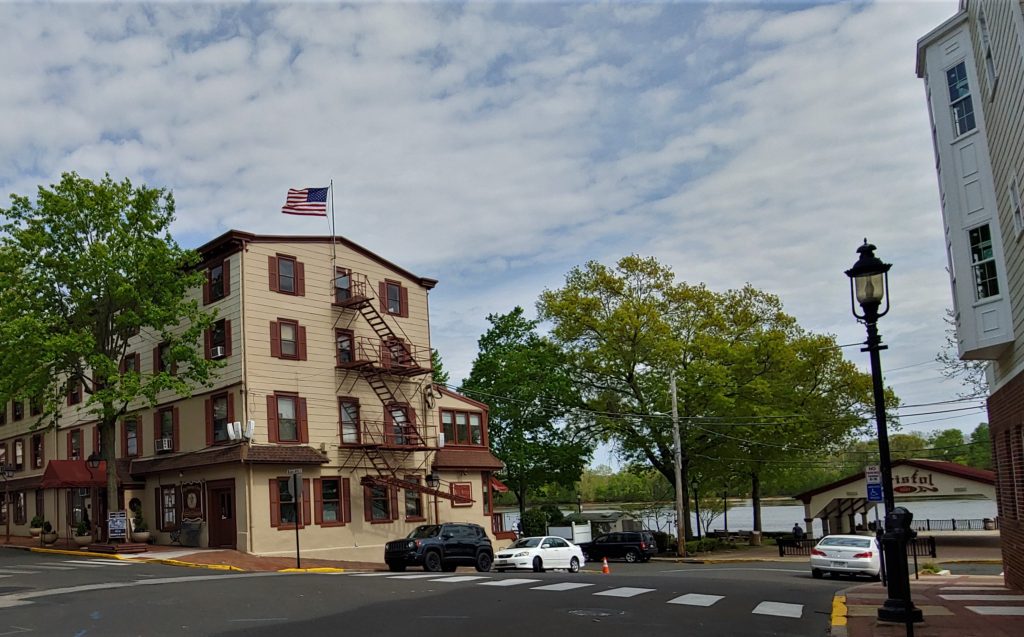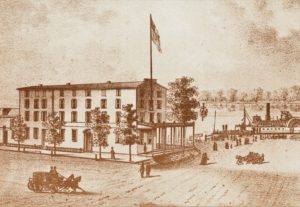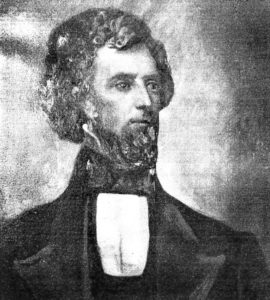“Blood will run to the bits of the horses’ bridles.”

Mary Anne and I enjoy dining at the King George II in Bristol. It’s there you get a sense of Colonial history dating to 1681 when the restaurant began serving customers as the Delaware House. The inn on the Delaware River has seen much history. But it was what happened the morning of April 15, 1861 that caught my attention.
News spread that Fort Sumter had fallen to Confederate forces to initiate the Civil War. Guests at the Delaware House and others in town were shocked. The rebel bombardment of the U.S. arsenal in Charleston Harbor re-awakened patriotic fever not seen since the Declaration of Independence. Most thought the conflict would be brief, maybe a couple months at most. Yet a prominent citizen predicted savagery without parallel. No one believed him. More on that later.
Charles Foster was the first to notice a state of emergency. “Looking across the river towards Burlington, I saw the large flag flying from the Beldin Hotel and knew it meant something out of the ordinary. Flags weren’t numerous and not often displayed except on Independence Day, Washington’s birthday and during political campaigns.
“As I stood looking at the flag, James S. Fine came along. I asked him if he knew what it meant. He replied, ‘Yes, have you not read the morning papers yet? Major Anderson has been compelled to surrender Fort Sumter to the rebels, and people all over the land are showing their patriotism by displaying the Stars and Stripes.’
“My young heart stirred with the news I had heard. Immediately going to the housetop, I flung my flag to the breeze. At that time few flags were owned by Bristol people and on national holidays but two were to be seen, the one on the Delaware House and the other my own.”
Within hours, Old Glory fluttered all over town. The demand for flags was so great Foster gave instructions on how to make them. Drum and fife strains were heard night and day. More than 80 young men in town rushed to enlist. Women began sewing undergarments and a silk pennant to identify the soldiers of the Montgomery Guard of Bristol. The watchword in the streets was “shoot every man who attempts to pull down the American flag.”

Next to the Delaware House, a towering flag pole went up with a Star Spangled Banner 20 feet high and 36 feet long. That afternoon a thunderstorm ripped the flag, causing half to break free and fly over the inn. Some saw it as a bad omen. Citizens raced to retrieve the banner. It was back flying the next day.
Local resident Robert Tyler, eldest son of former U.S. President John Tyler, leased a nearby river mansion. As a temperamental young man born and educated in the South, he was a clerk in the state Supreme Court in Philadelphia and frequently defended Southern grievances. When Fort Sumter was attacked, he was making his daily commute to Philly on a steamboat in the company of John Dorrance Sr. who wondered whether Southerners would unite to try and destroy the national government. Congress, Tyler replied, needed to pass a stringent law to protect the rights of Southerners to hold slaves and recover fugitives. If not, a long war was ahead “with consequences no man could calculate.”

Dorrance scoffed. The rebellion, he said, would be crushed in 90 days. An agitated Tyler replied cryptically, “Why John, if a battle between the Northern and Southern troops was to take place on your farm, the blood would run to the bits of the horses’ bridles.”
Tyler’s opinions got the best of him in Philadelphia. There were public demands for his arrest. Warned to flee, he boarded a train to Bristol. There he and his family feared for their lives. He told friends he had no vested interest in the South, that his wife and children were born in the North. Despite reassurances, they fled to New York, then to the South where he became Confederate Register of the Treasury.
After the war, Tyler visited Bristol where acquaintances welcomed him. “Finding myself as it were, an outlaw,” he told them, “I had no other alternative but to leave the North and take a position that was repugnant to my feelings and against my best interests.” That decision resulted in the government seizing his property and auctioning off his household goods. His leased mansion eventually became U.S. Sen. Joseph Grundy’s home, now a museum.
In the end, Tyler would see his prediction of a bloody war come true. Out of a population of 5,000, Bristol sent 44 officers and 461 soldiers into battle. Some never returned. Hostilities lasted five years and claimed 620,000 American lives, far more than any other war including World War II.
Sources include “A History of Bristol Borough” by Doron Green published in 1911; the American Battlefield Trust at https://www.battlefields.org; and help from Grundy Library archivist Eric Walerko

